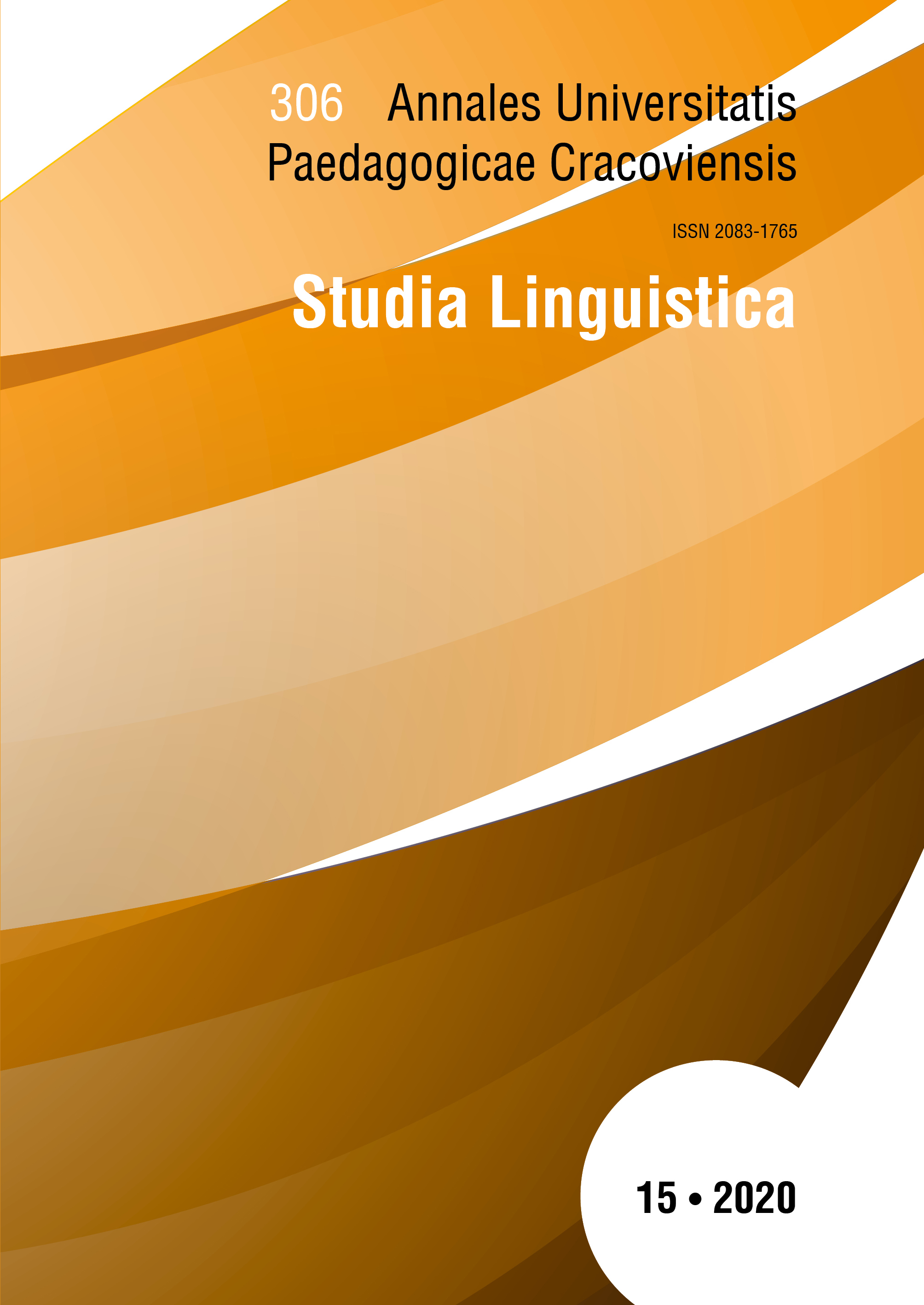Remarks on the lexical ecosystem (the case of the Polish language)
Main Article Content
Abstract
Bringing together basic assumptions of posthumanism and ecocriticism the essay critically explores the thesis of the fundamentally anthropocentric nature of language pointing at the nonanthroponormative element present in language and, most noticeably, in its vocabulary. We try to present a concept of the lexical ecosystem in which clusters of words are used with reference to people but also to plants and animals. The core of this system is constituted by words connected with life conceived of as zoe - biological duration of living organisms involving the processes of birth, maturation, aging, and dying. Clusters of words of this ecosystem address fundamental activities of living organisms such as breathing, digesting, moving, articulating sounds as well as inner and outer features of man. Hence, the essay suggests that the concept of the lexical ecosystem necessitates a new pedagogical approach towards the question of metaphor and metaphorical nature of language.
Downloads
Article Details
Author, submitting a text to the editorial board of the journal “Annales Universitatis Paedagogicae Cracoviensis. Studia Linguistica", certifies that the content of the article has not been published so far and that the work does not violate in any way the copyright or related rights of other person, as well as other rights of third parties, and that no one's rights to the work (or any part thereof) have been missed. After signing the contract, the property rights to the published materials are transferred to the Scientific Publisher of the University of the National Education Commission, Krakow.
“Annales Universitatis Paedagogicae Cracoviensis. Studia Linguistica” is an open access journal, and all its content is made available free of charge to users and institutions under the Creative Commons CC-BY-NC-ND 4.0 license (attribution, non-commercial use, no derivative works). Under this license, the authors agree that their work may be lawfully reused for any purpose, except for commercial purposes, without the prior consent of the author or publisher. Everyone can read, download, copy, print, distribute and process these works, provided that the author's marking and the original publication place are correct. Published texts may not be used to create derivative works (e.g. to translate and publish in another language without the consent of the publisher). This is in line with the BOAI (Budapest Open Access Initiative) definition. "Studia Linguistica" does not charge for submitting or processing articles.
References
Agapkina T., 2017, Rozpoznać w drzewie człowieka (na materiale ballad słowiańskich), [w:] Antropocentrizm w jazyke i kul’ture, otv. red. S.M. Tolstaja, Moskva.
Google Scholar
Bakke M., 2012, Bio-transfiguracje. Sztuka i estetyka posthumanizmu, Poznań.
Google Scholar
Barcz A., 2016, Realizm ekologiczny. Od ekokrytyki do zookrytyki w literaturze polskiej, Katowice.
Google Scholar
Burgat F., 2012, Une autre existence. La condition animale, Paris.
Google Scholar
Deleuze G., Guattari F., 2015, Tysiąc plateau [brak nazwiska tłumacza], Warszawa.
Google Scholar
Dobrzyńska T., 2019, Nasłuchiwania ech tragicznych wydarzeń w „Spalonych mapach” Tomasza Różyckiego, [w:] Język pisarzy: środki artystycznego wyrazu, red. T. Korpysz, A. Kozłowska, Warszawa, s. 281–291.
Google Scholar
Elżanowski A., Pietrzykowski T., 2017, Zwierzęta jako nieosobowe podmioty prawa, [w:] Sprawiedliwość dla zwierząt, red. B. Błońska, W. Gogłoza, W. Klaus, D. Woźniakowska-Fajst, Warszawa, s. 8–19.
Google Scholar
Filipowicz A., 2017, (Prze)zwierzęcenia. Poetyckie drogi do postantropocentryzmu, Gdańsk.
Google Scholar
Garrard G., 2004, Ecocriticism, London–New York.
Google Scholar
Głowiński M., Okopień-Sławińska A., Sławiński J., 1967, Zarys teorii literatury, Warszawa.
Google Scholar
Jarzyna A., 2019, Post-koiné. Studia o nieantropocentrycznych językach (poetyckich), Łódź.
Google Scholar
Jarzębowska G., 2019, Zoophilologica a studia nad zwierzętami w Polsce, „Teksty Drugie”, nr 4, s. 170–179.
Google Scholar
Kempf Z., 1985, Wyrazy „gorsze” dotyczące zwierząt, „Język Polski” LXXXV, nr 2–3, s. 125–144.
Google Scholar
Książek M., 2014, Nauka o ptakach, Białystok.
Google Scholar
Pelluchon C., 2017, Manifeste animaliste. Politiser la cause animale, Paris.
Google Scholar
Schollenberger J., 2018, Rośliny w pędzie. Darwina myślenie o granicy roślina – zwierzę, „Teksty Drugie”, nr 2, s. 102–119.
Google Scholar
Sławkowa E. [w druku], Miejsce człowieka w wielkim łańcuchu bytów dziś. Uwagi filologa, [w:] Pragmatyczne, artystyczne, kulturowe i społeczne aspekty współczesnej i dawnej polszczyzny. Fizyczne aspekty ludzkiego życia i ich odzwierciedlenie w języku, literaturze i sztuce.
Google Scholar
Szerszunowicz J., 2011, Obraz człowieka w polskich, angielskich i włoskich leksykalnych i frazeologicznych jednostkach faunicznych, Białystok.
Google Scholar
Tolstaja S.M., 2017, Antropocentrizm w jazyke i kul’ture, otv. red. S. M. Tolstaja, Moskva.
Google Scholar
Tołstojowa S.M., 2018, Świat człowieka i jego granice w świetle danych językowych, „Etnolingwistyka. Problemy Języka i Kultury”, t. 30, s. 15–30.
Google Scholar
Tymieniecka-Suchanek J., Słowo wstępne, [w:] Człowiek w relacji do zwierząt, roślin i maszyn w kulturze, t. 1: Aspekt posthumanistyczny i transhumanistyczny, red. J. Tymieniecka-Suchanek, Katowice 2014, s. 9–13.
Google Scholar
Waśkowski K., 2017, Polskie nazwy zwierząt. Studium historycznojęzykowe, Nowy Targ.
Google Scholar
Zajączkowska U., 2019, Patyki i badyle, Warszawa.
Google Scholar
Żmigrodzki P., 1995, Zdania metaforyczne w języku polskim. Opis semantyczno-składniowy, Katowice.
Google Scholar
Słownik języka polskiego PWN, online: sjp.pwn.pl [dostęp: 25.03.2020]
Google Scholar
